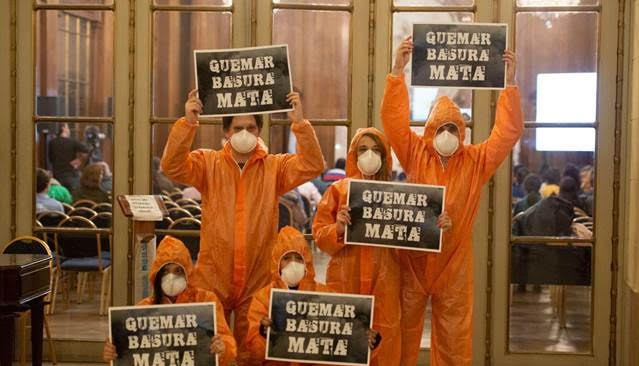It is necessary to understand that day by day around 33 thousand tons of waste are generated daily in Colombia.
After the approval of the National Development Plan and disclosure of one of the actions proposed by the president of Colombia, which is provided in article 227 on the strategy of Zero Waste the creation of Technology Parks, that is to say, the spaces reserved for the storage and incineration of waste, Greenpeace Colombia warns that through this article, a dangerous practice is being promoted that could generate several deaths due to environmental contamination and makes a strong warning about the danger and the damage that this practice generates both in the health of Colombians and in the conservation of the environment.
“The incineration of waste in Colombia would be a great obstacle to move towards sustainable cities, fair and equitable. The burning of garbage would be another step in the culture of the disposable. Undoubtedly, as a society, government and companies we have to move towards consumption habits that are more conscious, responsible and respectful of the planet and all the beings that inhabit it. Burning garbage is not the solution”, says Tatiana Céspedes, Campaigns Coordinator for Greenpeace Colombia.
This strategy included within the Zero Waste project that endangers Colombians and that it intends that within the dimension of the logistic generators, technology parks be created in strategic areas of the cities where there are incinerator plants and where trade recyclers cannot access potentially recyclable material.
“In a few words, the current Government translates its zero waste policy into one of the easiest actions, that not only lead to the generation of extensive contamination – after there has been a red alert in several cities in the country – but, in one of the most dangerous practices and in a false solution that brings enormous environmental and public health risks: burning garbage, (Waste incineration) and not, in civic education and awareness actions so that people learn to separate waste as it was presented at the beginning”, added Céspedes.
It should be noted that the economic valuation, which cites the PND refers to the incineration of garbage and therefore it is nothing more than a maneuver proposed by the garbage management public service companies, contrary to the world treaties that seek to mitigate the environmental and social problem. Aggravated with the fact that recovery or incineration technology as it is more commonly known, are unconstitutional measures of environmental management.
It is because of that Greenpeace Colombia makes an urgent call and a clear warning, to the national government, to clarify in detail article 182 of the National Development Plan which are the strategies and actions that have the dimensions from the field of consumption, industrial production, and above all show what is the interest of the current government in the dimension of logistic generators for promoting a practice that causes death such as waste incineration, camouflaged under the word “creation of technology parks”.
ARTICLE 227 “ZERO WASTE PROGRAM. The Zero Waste Program is created, headed by the Ministry of Housing, City and Territory, within a maximum term of 1 year from the entry into force of this law, which will articulate the instances of the national Government, the territorial entities, the utility companies and civil society; it will guarantee the participation of the recycling population and their organizations, promoting their inclusion and socioeconomic insertion; It will determine the regulatory, supervision and control aspects, and the investments required to advance in the elimination of burial towards the implementation of technological and environmental parks, treatment and vwaste allocation, promotion of technological development, environmental conservation and climate change mitigation; it will define a strategic plan for the definitive closure of the open-air dumps and temporary cells, promoting solutions that prioritize the treatment and use of waste; and will promote the circular economy”.
It is necessary to understand that every day around 33 thousand tons are generated of waste in Colombia, of which more than 65% correspond to the fraction of waste that cannot be used, that is, that is not capable of being recycled.
Thusthe impossibility of recycling or reusing this alarming amount of waste It has given rise to the National Government to justify arguments regarding the need to give a final treatment to them to be “valorized” in incineration plants in which the calorific power is used and electrical energy is produced.
In short, the incineration of waste does not solve the root problem. In reality, this type of measure implies maintaining a model of excessive waste generation, as well as continuing to use large volumes of disposable materials.. This is added to the potential damage to health and the environment that have already been detailed in the first section of this report. Thus, the decisions that governments make are definitely decisive in terms of the behavior of industries that manufacture products that have an extremely short useful life.
Greenpeace Colombia forcefully rejects this practice and requests the Government that excludes the burning of waste, polluting and harmful to health and the environment.
